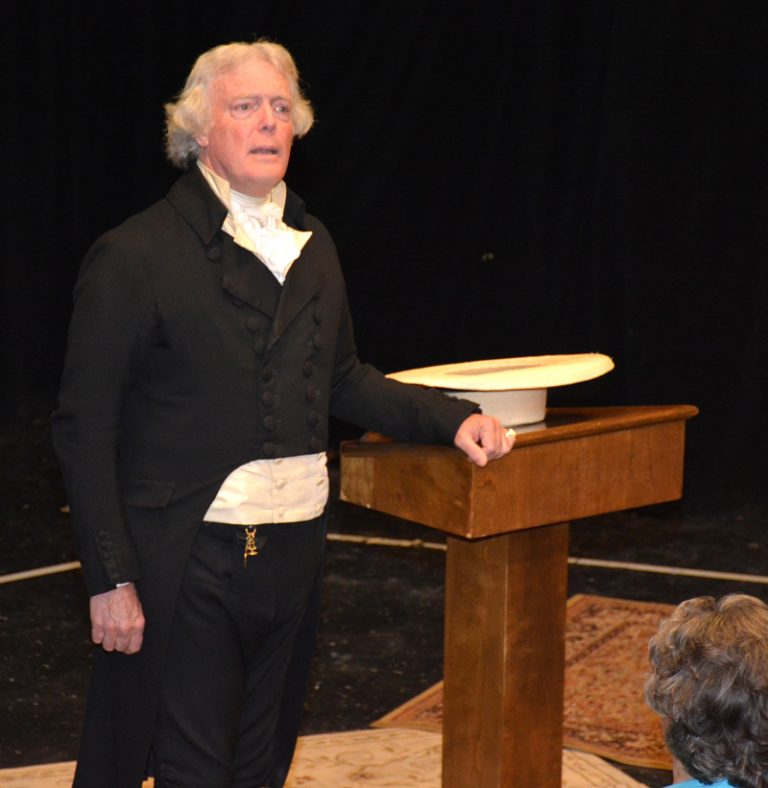Thomas Jefferson tackles slavery in final VGCC lecture

Capping off a series of lectures for students and the public, Vance-Granville Community College welcomed Thomas Jefferson, as portrayed by Bill Barker, to campus in April. The subject of Barker’s third and final presentation was “Mr. Jefferson and Slavery.” Earlier lectures focused on the pursuit of science and the United States Constitution.
Before introducing the “Founding Father” for his final scheduled appearance, VGCC English department chair David Wyche thanked Eddie Ferguson, the college’s Endowment Fund director, for helping to arrange Barker’s visits. Barker, the critically acclaimed resident “Mr. Jefferson” at Colonial Williamsburg, Va., has a local connection, as his father was an Oxford native and he has many relatives in Granville County.
Jefferson, as interpreted by Barker, started by defining the subject as “the enslavement of one’s fellow man as an element of property and thereby denying that individual their inherent right provided by nature and nature’s God to become everything they can possibly be in the short term our Creator provides us on this globe.”
Born into a well-established slaveholding society in 1743, Jefferson knew as a youth that he would inherit more than 7,000 acres and upwards of 100 slaves from both his parents’ estates. Slavery was, as he put it, “an everyday fact of life.” Still, as young Jefferson studied history and the law, he struggled to justify the institution. He learned that the ancient Roman Empire’s Justinian Code declared that “all men are born free,” and yet there was slavery, originally a voluntary state, in the Roman world. One Roman practice, Jefferson learned, was that “in war, a defeated people were then enslaved for a period of time so that they might become adherents to the laws of Rome and then later, perhaps, receive their citizenship.”
As Jefferson studied Virginia’s laws of slavery, Barker said, he came “to one conclusion: that the wisdom of the ancient world was forgotten that all men are born free.” Finally, in the age of the Enlightenment in which Jefferson lived, men began to rediscover that basic principle.
“When I was first elected to the old Virginia House of Burgesses, I thought I might make a difference,” Jefferson recalled for the VGCC audience. “I moved that we begin a debate on ending the importation of slaves to Virginia.” There was an uproar from the other slaveholding members of the colonial legislature. “They said, ‘Who is this turncoat to his own class? Who is this upstart from the wilderness?’ I was denied that motion.”
When drafting the Declaration of Independence, Jefferson included a statement that criticized the British King for sustaining the slave trade, but his fellow Southerners in the Continental Congress removed it. “The clause was expunged for the sake of our political unanimity,” Jefferson noted, “but we had opened the door for this argument to continue.”
In 1807, Jefferson, as President, signed into the law an act prohibiting the importation of any additional slaves into the United States, some 40 years after he had first suggested such a measure in Virginia. Still, the institution of slavery continued, and Jefferson continued to own human beings, although he called them his “people,” never his “slaves.”
Quoting an ancient Roman writer who had been a slave, Jefferson said of his moral struggle over slavery, “It is as if we hold a wolf by the ear, that we cannot let go nor hold onto….We have justice on the one hand, self-preservation on the other.” But, he concluded, “God is a just God; He cannot but abhor the institution of slavery. His justice will not sleep forever…These people ought to be free.”
Asked by an audience member to comment on Jefferson’s relationship with Sally Hemings (a slave with whom, many experts believe, he had several children), Barker declined, because when in character, he sticks closely to what he has found in an exhaustive study of Jefferson’s writings. The third President of the United States never discussed that relationship. Besides, Barker argued as Jefferson, the lady was not present to offer her own viewpoint.
Above: Bill Barker, as Thomas Jefferson, delivers his third and final lecture in a series sponsored by the VGCC Arts and Sciences division in the small auditorium on the college’s Main Campus. (VGCC photo)
More photos: Check out this album of photos from all 3 lectures on Flickr !
See also:
- Thomas Jefferson discusses Constitution in second VGCC lecture
- Thomas Jefferson makes first visit to VGCC

